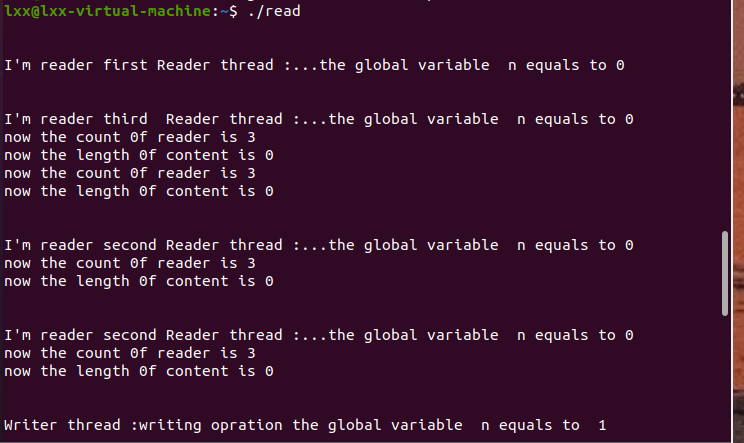1.描述操作系统中“读者-写者”问题,理解问题的本质,提交你理解或查找到的文本资料
抽象解释
- 多个进程访问一个共享的数据区
- 读者(读进程)只能读数据,写者(写进程)只能写数据
- 适用于数据库、文件、内存、寄存器等数据区的访问模型
- 如12306购票系统,由于用户量庞大和数据量巨大,不可避免地会出现多个进程同时查询(读)或修改(写)同一条数据的情况
读者写者问题的三个约束条件
- 读者之间不互斥(你和室友可以同时查看元旦那天早上7点的高铁信息)
- 写者之间必须互斥(你和室友不能同时申请购买元旦那天早上七点G1234的6D号位置)
- 读者写者之间也互斥(假如你正在买G1234的6D座位,你的室友无法读到该位置的售票信息)
2.利用多线程完成reader 和writer3。在main中测试若干个reader 和writer的测试,提交截图说明代码的正确性
代码
#include <stdio.h>
#include <stdlib.h>
#include <pthread.h>
#include <semaphore.h>
#include <unistd.h>
sem_t rmutex,wmutex;
static void *readerThread(void *arg);
static void *reader3Thread(void *arg);
static void *reader2Thread(void *arg);
static void *writerThread(void *arg);
int readcount = 0;
int n = 0;
int nowLen = 1;
char contentArticle[10][100];
int main(){
pthread_t readerTidp,writerTidp,reader3Tidp,reader2Tidp;
void *retval;
if(sem_init(&rmutex,0,1)==-1||sem_init(&wmutex,0,1)==-1){
printf("sem_init error\n");
return -1;
}//init semaphore
if(pthread_create(&readerTidp,NULL,readerThread,NULL) !=0||pthread_create(&writerTidp,NULL,writerThread,NULL) !=0||pthread_create(&reader3Tidp,NULL,reader3Thread,NULL) !=0||pthread_create(&reader2Tidp,NULL,reader2Thread,NULL) !=0){
printf("pthread_create error\n");
return -2;
}//init pthread
pthread_join(readerTidp,&retval);
pthread_join(reader3Tidp,&retval);
pthread_join(reader2Tidp,&retval);
pthread_join(writerTidp,&retval);
sem_destroy(&rmutex);
sem_destroy(&wmutex);
return 0;
}
static void *readerThread(void *arg){
for(int i = 0;i < 10;i++)
{
sem_wait(&rmutex);
if(readcount == 0)sem_wait(&wmutex);
readcount = readcount+1;
sem_post(&rmutex);
//read operatiom
printf("\n\nI'm reader first Reader thread :...the global variable n equals to %d\n",n);
for(int j = 0;j < nowLen-1;j++)
{
for(int k = 0;k < 26;k++)
printf("%c",contentArticle[j][k]);
printf("\n");
}
printf("now the count 0f reader is %d\n",readcount);
printf("now the length 0f content is %d\n",nowLen-1);
sleep(5);
sem_wait(&rmutex);
readcount = readcount-1;
if(readcount == 0)sem_post(&wmutex);
sem_post(&rmutex);
sleep(1);
}
}
static void *reader3Thread(void *arg){
for(int i = 0;i < 10;i++)
{
sem_wait(&rmutex);
if(readcount == 0)sem_wait(&wmutex);
readcount = readcount+1;
sem_post(&rmutex);
//read operatiom
printf("\n\nI'm reader third Reader thread :...the global variable n equals to %d\n",n);
for(int j = 0;j < nowLen-1;j++)
{
for(int k = 0;k < 26;k++)
printf("%c",contentArticle[j][k]);
printf("\n");
}
printf("now the count 0f reader is %d\n",readcount);
printf("now the length 0f content is %d\n",nowLen-1);
sleep(5);
sem_wait(&rmutex);
readcount = readcount-1;
if(readcount == 0)sem_post(&wmutex);
sem_post(&rmutex);
sleep(8);
}
}
static void *reader2Thread(void *arg){
for(int i = 0;i < 10;i++)
{
sem_wait(&rmutex);
if(readcount == 0)sem_wait(&wmutex);
readcount = readcount+1;
sem_post(&rmutex);
//read operatiom
printf("\n\nI'm reader second Reader thread :...the global variable n equals to %d\n",n);
for(int j = 0;j < nowLen-1;j++)
{
for(int k = 0;k < 26;k++)
printf("%c",contentArticle[j][k]);
printf("\n");
}
printf("now the count 0f reader is %d\n",readcount);
printf("now the length 0f content is %d\n",nowLen-1);
sem_wait(&rmutex);
readcount = readcount-1;
if(readcount == 0)sem_post(&wmutex);
sem_post(&rmutex);
sleep(4);
}
}
static void *writerThread(void *arg){
for(int i = 0;i < 10;i++)
{
sem_wait(&wmutex);
//writer operation
n = n+1;
for(int k = 0;k < 26;k++)
contentArticle[nowLen-1][k] = 'z'-k;
nowLen++;
printf("\n\nWriter thread :writing opration the global variable n equals to %d \n",n);
sleep(2);
sem_post(&wmutex);
sleep(3);
}
}
截图




